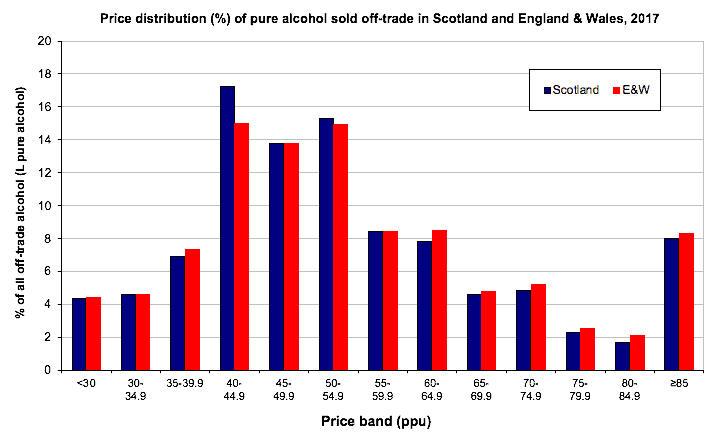Scots bought 40% more than the weekly recommended guidelines worth of alcohol last year, according to the latest monitoring report published by NHS Health Scotland.
The amount of drink sold in the country was equivalent to 19.6 units per week per adult, higher than the UK recommended limit of 14 units. The report’s lead author said that the consumption figures show that alcohol remains a ‘significant health concern’ for Scots. In England & Wales, 17.1 units worth of alcohol per person were sold, equating to every single adult in the country drinking 22% more than the weekly recommended guidelines worth of alcohol last year.

Source: NHS Scotland, MESAS monitoring report 2018 |
Monitoring and Evaluating Scotland’s Alcohol Strategy (MESAS) also found that 2017 saw the biggest annual increase in the price of alcohol sold through supermarkets and off-licences, from 52 to 54 pence per unit. Most alcohol was sold in both England & Wales and in Scotland for between 40 and 55 pence per unit, and almost half of alcohol in Scotland (47%) was purchased for under 50 pence per unit, an indication that the Scottish Government’s move to introduce minimum unit pricing would target a significant section of the drinks market.
Public Health Minister Aileen Campbell said the report ‘sets out the significant levels of harm that individuals, families and communities experience through alcohol misuse, highlighting the increasing role that sales in supermarkets and off-licences play in Scotland’s relationship with alcohol.
‘The total volume of alcohol sold in Scotland in 2017 is similar to the level sold in 1994.
‘However, since 1994 we’ve seen a huge shift from people buying alcohol in pubs, clubs and restaurants, to buying in supermarkets and off-licences.’ In the 21st century alone, the proportion of alcohol sold in off-licences has risen 12 percentage points (from 60 to 72% of all alcohol sold).
Campbell added: ’Our world-leading minimum unit pricing policy now ensures no alcohol can be sold below 50p per unit. I am confident minimum unit pricing will make a significant difference to the harms shown in this report.’
Commenting on the report, lead author Lucie Giles said: ‘As a leading cause of illness and early death, alcohol consumption and related harm remains a significant public health concern.
‘With rates of alcohol-specific deaths increasing in recent years, and alcohol related hospital admissions 4 times higher than they were in the 1980s, it is more important than ever that we continue to monitor alcohol price, consumption and alcohol-related harms to inform and evaluate policy.
‘Preventative action is necessary to reduce alcohol consumption if long-term improvements in alcohol-related harm are to be realised. And with the most harm being felt in our poorest areas, we must take action to reduce the health inequalities related to alcohol.’
‘These latest figures confirm yet again that across the UK we continue to drink too much alcohol,’ says Professor Sir Ian Gilmore, a liver physician and the chair of the Alcohol Health Alliance (AHA). ‘The results can be seen in our hospital wards and on our streets. Alcohol related deaths have doubled in the past 20 years and dealing with alcohol harm is costing the British economy as much as £52 billion a year.’
The NHS Scotland report also reveals that alcohol is 64% more affordable in the UK than it was in 1980, a fact which is helping to drive sales and consumption and which Scotland and Wales are addressing through a minimum unit price.
‘While the Westminster Government’s announcement of a new alcohol strategy for England is welcome, it must be used to put alcohol policy on a more evidence-based footing,’ said Professor Gilmore. ‘That means tackling alcohol which is too affordable, too available and too heavily promoted.
‘In particular, we need to see the introduction of a 50p minimum unit price in England without delay. The latest evidence indicates it would save 525 lives a year, reduce hospital admissions by 22,000 a year and save the health service £1.3 billion over 20 years.’
With only 16% of the public able to correctly identify the weekly low risk guidelines of 14 units and only one in 10 aware that drinking alcohol increases the risk of a range of cancers, the AHA is also calling on Government to help consumers make informed decisions about their drinking habits by making health warnings on alcohol labels mandatory and by investing in health information campaigns.
Added Professor Gilmore: ‘People have a right to know what they are consuming and the Government has a responsibility to inform them. At the moment they are being kept in the dark. The announcement of a new alcohol strategy and a review of the impact of minimum pricing in England provides the opportunity to take a bold, evidence-based approach to tackling the widespread harms caused by alcohol. It is an opportunity we can’t afford to waste.’
